
Crucial Or Merely Symbolic? What People Think Of COP30 And Climate Change
The 30th annual United Nations climate conference starts today, facing a crisis of credibility. Within a decade of the landmark 2015 Paris Agreement, global temperatures breached the critical 1.5°C threshold in 2024. Meanwhile, the world's largest historical emitter, the US, under the presidency of Donald Trump, has once again threatened to withdraw from commitments to reduce global warming.
While the leaders of the world struggle to contain the climate crisis, vulnerable communities across the globe are bearing the brunt. Younger people from middle-income countries say they are ready to make changes to their lifestyles, while also pinning hopes on global cooperation to find sustainable solutions. Mint explores two recent surveys that shed light on people's attitudes towards climate change.
Effective or merely symbolic?While Conference of the Parties (COP) to the UN Framework Convention on Climate Change have produced landmark agreements such as the Kyoto Protocol (binding targets to reduce greenhouse gas emissions ) and the 2015 Paris Agreement (limiting global warming to well below 2°C), overall progress remains slow and inadequate. Three decades since its inception, debates rage on about COP's effectiveness, though many argue it remains crucial for international climate cooperation.
Also Read | Can snake oil solutions clean North India's deadly aA recent survey of 23,700 respondents across 30 countries by Paris-based market research firm Ipsos Global Advisor showed that nearly one in two people (49%) believe COP30 is“merely symbolic" and doesn't drive real climate action, while a third believe it will prove“effective". The remaining 17% were neutral. Interestingly, views differed starkly between people in developed and developing nations. Developed nations were largely sceptical about climate action, with 46% in the US and 73% in France saying the summit is merely symbolic. In contrast, this figure was much smaller in countries such as India (28%), Indonesia (16%) and South Africa (37%), among others.
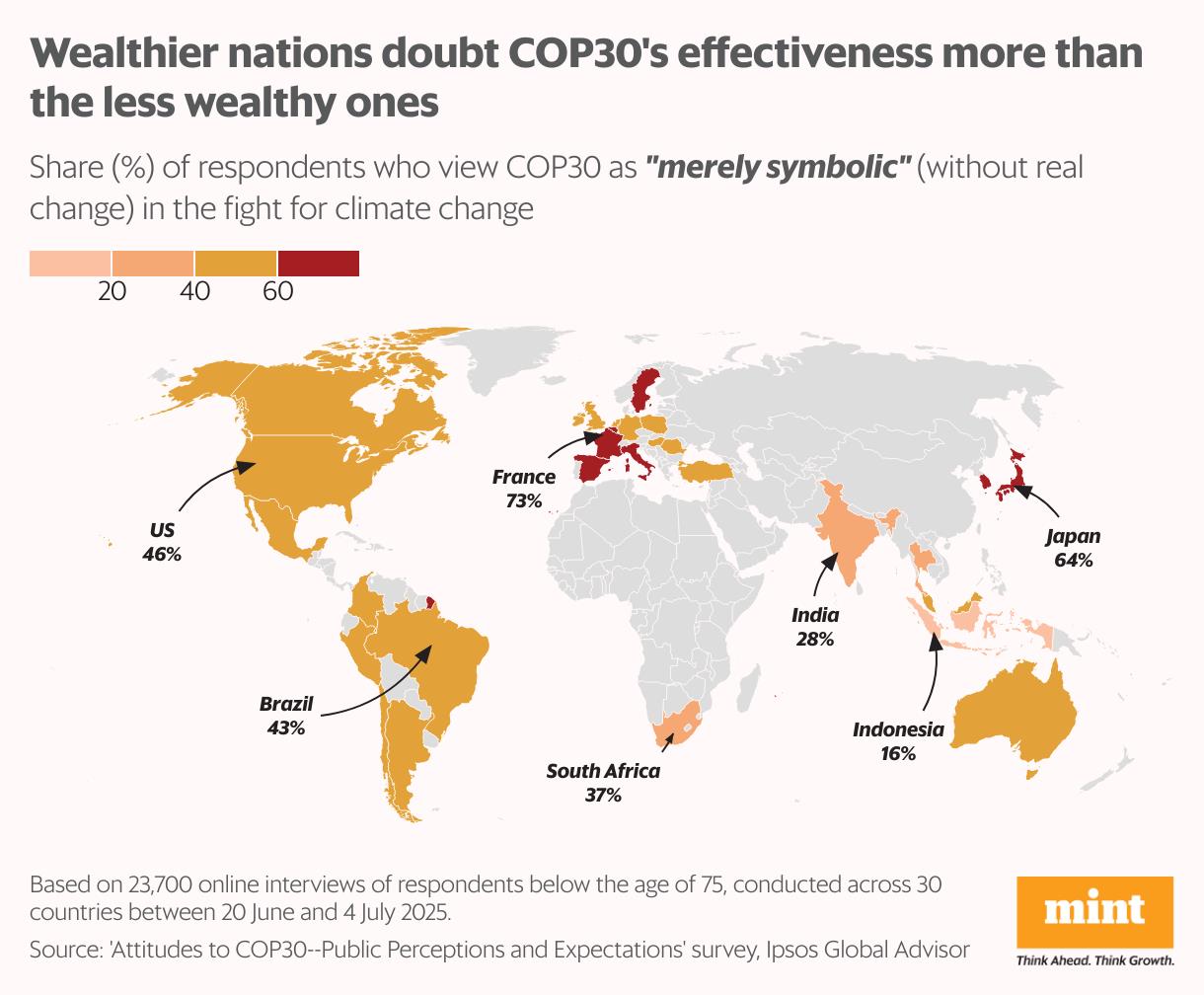
Communities in crisis
The global climate crisis has been long recognized as one of the biggest issues of this century. Its impact is being seen, more than ever, in the form of heat waves, wildfires and flash floods.
A separate survey of 12,375 people by US-based fact tank Pew Research Center, focusing on middle-income countries, revealed widespread alarm across nine nations-Mexico, Argentina, Brazil, Nigeria, South Africa, Kenya, Turkey, India and Indonesia. Mexico led with 83% respondents, saying the climate has impacted local communities, followed closely by Argentina (81%) and Turkey (79%). In India, three-fourths of respondents said climate change is affecting them where they live and work. Over a third of Indian respondents said climate change impacted them“a great deal". This was the third lowest after Indonesia (33%) and Nigeria (26%).
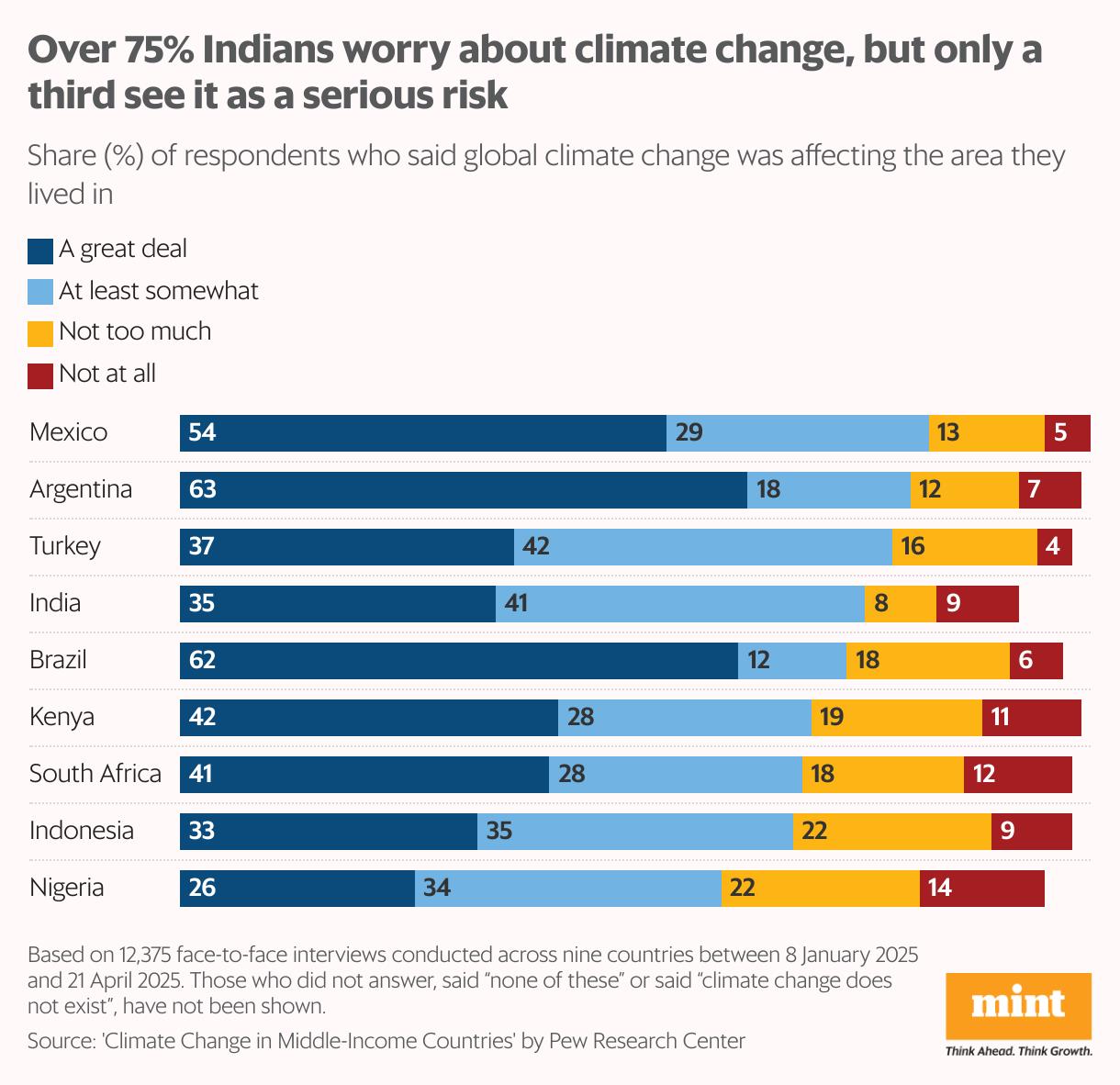
While the figure is low, more people in India are reporting serious risks from climate change. In 2019, only 28% had said climate change impacted them“a great deal". The rise was much higher for Brazil, which saw a rise of 12 percentage points since 2019 to 62% in 2025.
Shifting opinionsHaving witnessed climate impacts in their communities, many residents of middle-income nations harbour deep anxieties about their future as well. The Pew survey showed the majority of respondents across all nine countries, including 72% in Nigeria and 91% in Indonesia, fear climate change will harm them personally at some point. What is particularly striking is the intensity of this concern. About two-thirds in Indonesia and Argentina are“very concerned" about personal harm from climate change, while 48% Indians and 56% of Brazilians share deep worry.
Also Read | NITI Aayog proposes new panel to supercharge India's net-zero pHowever, a comparison with a 2015 Pew survey shows notable shifts, with fewer adults in five of the nine nations now reporting such deep concerns. Nigeria experienced the sharpest decline, falling from 63% to 38%, followed by Brazil (78% to 56%) and India (69% to 48%). On the other hand, concern was up in Indonesia (42% to 63%), South Africa (39% to 60%) and Argentina (58% to 64%).

Young vs old
As the climate crisis has worsened, young people in several parts of the world have made changes to their lifestyles-using paper straws, carrying cloth bags and buying electric vehicles. This became a mass movement, with companies also joining in. While many world leaders downplay or deny the climate crisis, young people's commitment to save the planet hasn't wavered. Across all nine countries, those witnessing climate change first-hand show greater willingness to transform their lifestyle, with a median of 80% saying they will make at least some changes to combat the crisis, driven by the younger cohort.
Younger adults (aged 18-34) consistently outpace their older counterparts (50+) in their willingness to act. Indonesia has the starkest divide: 89% of youth are ready to change versus 69% of older adults, followed by Turkey (64% versus 45%). India and Nigeria had the narrowest gaps of just 6 and 3 percentage points, respectively.
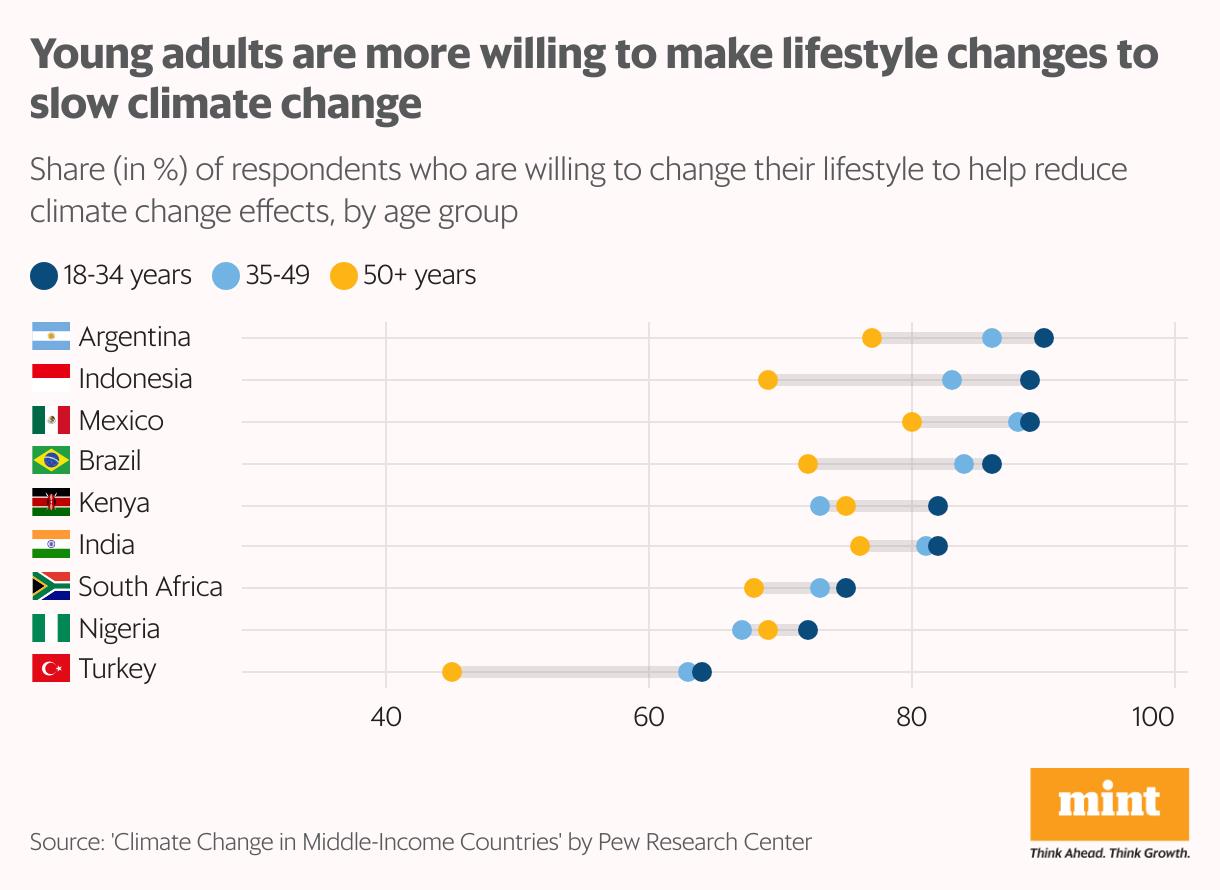
This generational divide extends to personal fears. In India, Indonesia, Mexico and Turkey, younger adults express significantly more concern about climate change harming them personally than those aged 50 and older.
Persisting problemRespondents also said the inability to sustainably address the climate crisis may be rooted in governance failures. From absent political will and weak enforcement to inadequate funding, respondents identified several reasons for the lack of progress on this front, revealed the Ipsos survey.
Also Read | Climate threat: Why businesses must watch out for a rising tide of water rIndian respondents identified lack of enforcement against deforestation and pollution (44%) as the primary obstacle, reflecting the current anger against the country's crippling air pollution. Technology gaps followed at 32%, while 30% cited funding shortages for environmental projects. One in four respondents flagged lack of political will from government leaders. Strikingly, only 14% pointed to fossil fuel dependence as the main barrier, despite India's current and future dependence on coal to meet its energy needs.
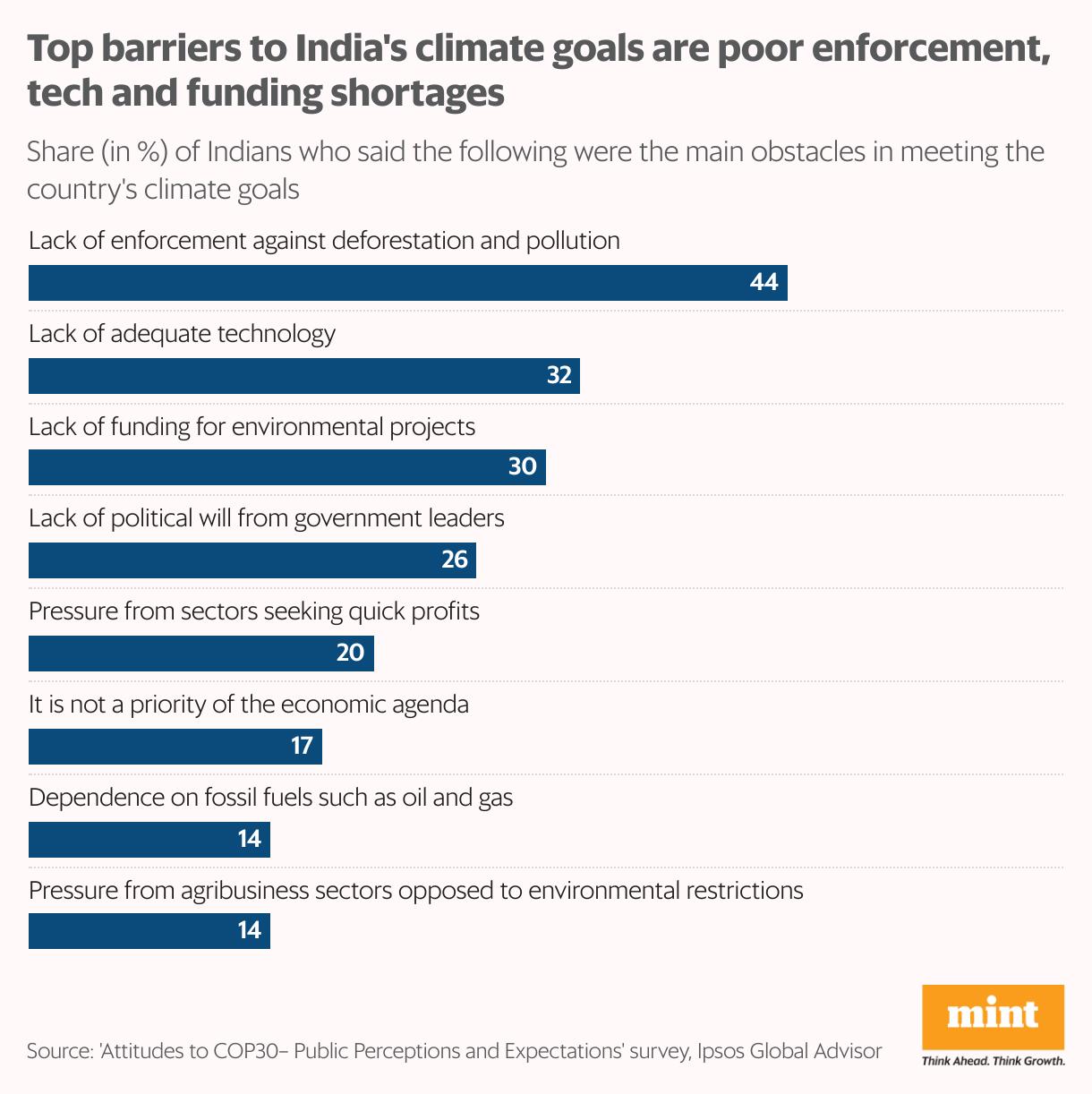
While COP remains battleground between historical emitters (the US and Europe) and rising economies (China and India), what the world needs is urgent action and cooperation to address the biggest crisis of our time.
Legal Disclaimer:
MENAFN provides the
information “as is” without warranty of any kind. We do not accept
any responsibility or liability for the accuracy, content, images,
videos, licenses, completeness, legality, or reliability of the information
contained in this article. If you have any complaints or copyright
issues related to this article, kindly contact the provider above.

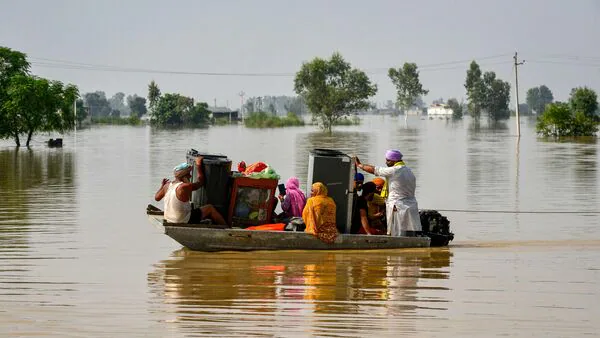
















Comments
No comment